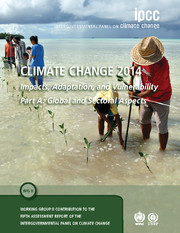 Climate Change 2014 – Impacts, Adaptation and Vulnerability: Part A: Global and Sectoral Aspects
Climate Change 2014 – Impacts, Adaptation and Vulnerability: Part A: Global and Sectoral Aspects Book contents
- Frontmatter
- Contents
- Foreword, Preface, and Dedication
- Summary for Policymakers
- Technical Summary
- Cross-Chapter Boxes
- Chapters 1-20
- Chapter 1 Point of Departure
- Chapter 2 Foundations for Decision Making
- Chapter 3 Freshwater Resources
- Chapter 4 Terrestrial and Inland Water Systems
- Chapter 5 Coastal Systems and Low-Lying Areas
- Chapter 6 Ocean Systems
- Chapter 7 Food Security and Food Production Systems
- Chapter 8 Urban Areas
- Chapter 9 Rural Areas
- Chapter 10 Key Economic Sectors and Services
- Chapter 11 Human Health: Impacts, Adaptation, and Co-Benefits
- Chapter 12 Human Security
- Chapter 13 Livelihoods and Poverty
- Chapter 14 Adaptation Needs and Options
- Chapter 15 Adaptation Planning and Implementation
- Chapter 16 Adaptation Opportunities, Constraints, and Limits
- Chapter 17 Economics of Adaptation
- Chapter 18 Detection and Attribution of Observed Impacts
- Chapter 19 Emergent Risks and Key Vulnerabilities
Chapter 4 - Terrestrial and Inland Water Systems
Published online by Cambridge University Press: 05 January 2015
- Frontmatter
- Contents
- Foreword, Preface, and Dedication
- Summary for Policymakers
- Technical Summary
- Cross-Chapter Boxes
- Chapters 1-20
- Chapter 1 Point of Departure
- Chapter 2 Foundations for Decision Making
- Chapter 3 Freshwater Resources
- Chapter 4 Terrestrial and Inland Water Systems
- Chapter 5 Coastal Systems and Low-Lying Areas
- Chapter 6 Ocean Systems
- Chapter 7 Food Security and Food Production Systems
- Chapter 8 Urban Areas
- Chapter 9 Rural Areas
- Chapter 10 Key Economic Sectors and Services
- Chapter 11 Human Health: Impacts, Adaptation, and Co-Benefits
- Chapter 12 Human Security
- Chapter 13 Livelihoods and Poverty
- Chapter 14 Adaptation Needs and Options
- Chapter 15 Adaptation Planning and Implementation
- Chapter 16 Adaptation Opportunities, Constraints, and Limits
- Chapter 17 Economics of Adaptation
- Chapter 18 Detection and Attribution of Observed Impacts
- Chapter 19 Emergent Risks and Key Vulnerabilities
Summary
4.1. Past Assessments
The topics assessed in this chapter were last assessed by the IPCC in 2007, principally in WGII AR4 Chapters 3 (Kundzewicz et al., 2007) and 4 (Fischlin et al., 2007), but also in WGII AR4 Sections 1.3.4 and 1.3.5 (Rosenzweig et al., 2007). The WGII AR4 SPM stated “Observational evidence from all continents and most oceans shows that many natural systems are being affected by regional climate changes, particularly temperature increases,” though they noted that documentation of observed changes in tropical regions and the Southern Hemisphere was sparse (Rosenzweig et al., 2007). Fischlin et al. (2007) found that 20 to 30% of the plant and animal species that had been assessed to that time were considered to be at increased risk of extinction if the global average temperature increase exceeds 2°C to 3°C above the preindustrial level with medium confidence, and that substantial changes in structure and functioning of terrestrial, marine, and other aquatic ecosystems are very likely under that degree of warming and associated atmospheric CO2 concentration. No time scale was associated with these findings. The carbon stocks in terrestrial ecosystems were considered to be at high risk from climate change and land use change. The report warned that the capacity of ecosystems to adapt naturally to the combined effect of climate change and other stressors is likely to be exceeded if greenhouse gas (GHG) emission continued at or above the then-current rate.
4.2. A Dynamic and Inclusive View of Ecosystems
There are three aspects of the contemporary scientific view of ecosystems that are important to know for policy purposes. First, ecosystems usually have imprecise and variable boundaries. They span a wide range of spatial scales, nested within one another, from the whole biosphere, down through its major ecosystem types (biomes), to local and possibly short-lived associations of organisms. Second, the human influence on ecosystems is globally pervasive. Humans are regarded as an integral, rather than separate, part of social-ecological systems (Gunderson and Holling, 2001; Berkes et al., 2003).
- Type
- Chapter
- Information
- Climate Change 2014 – Impacts, Adaptation and Vulnerability: Part A: Global and Sectoral AspectsWorking Group II Contribution to the IPCC Fifth Assessment Report, pp. 271 - 360Publisher: Cambridge University PressPrint publication year: 2014
- 14
- Cited by


